An Introduction to Smart Contract Development
In the ever-evolving landscape of blockchain technology, smart contracts have emerged as a revolutionary force, reshaping how we transact and interact in the digital realm. These self-executing contracts, encoded with predefined rules and automated actions, have ushered in a new era of trust and efficiency. If you’re intrigued by the potential of smart contracts but find the concept somewhat intimidating, you’ve come to the right place. This article is your gateway to the fascinating world of smart contract development. We’ll unravel the complexities, provide real-world insights, and equip you with the knowledge needed to embark on your journey into the realm of decentralized applications (dApps), financial instruments, and more.
Smart contract development isn’t just for blockchain enthusiasts; it’s a skill that’s becoming increasingly essential in the business world. From DeFi (Decentralized Finance) applications to NFT (Non-Fungible Token) marketplaces and beyond, smart contracts are the building blocks of the decentralized future. Whether you’re a developer looking to expand your skill set, an entrepreneur exploring opportunities in the blockchain space, or simply a curious mind eager to understand this transformative technology, this article will guide you through the fundamentals. So, fasten your seatbelt and get ready to explore the exciting world of smart contract development—a journey that could redefine how we interact and conduct business in the digital age.
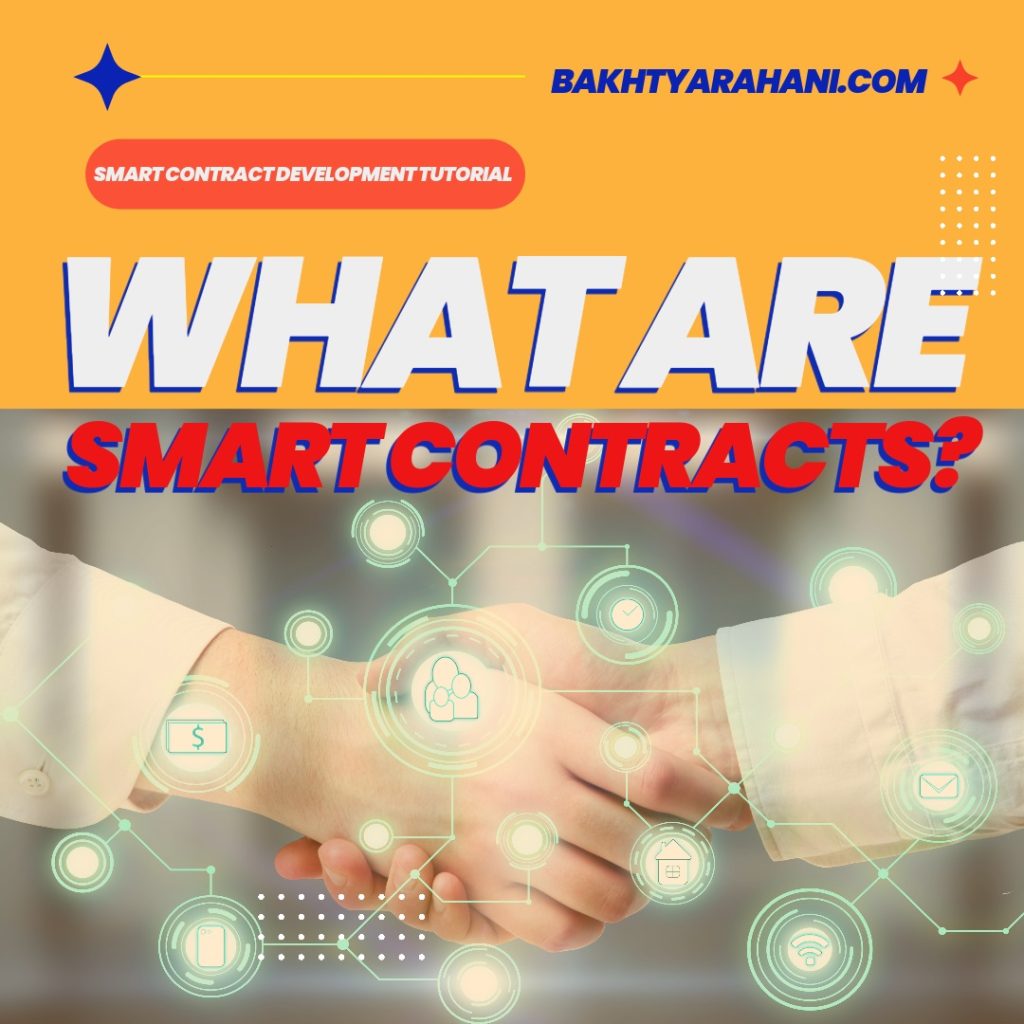
What are smart contracts?
Smart contracts, often hailed as the backbone of blockchain technology, are self-executing agreements with the power to revolutionize the way we conduct transactions. Imagine a digital contract that not only defines the terms and conditions of a deal but also enforces and executes them automatically, without the need for intermediaries. These ingenious pieces of code are designed to ensure trust, transparency, and efficiency in various industries, from finance to real estate and beyond. In this section, we’ll dive into the core of what smart contracts are, how they function, and why they are considered the future of secure, decentralized transactions.
At their essence, smart contracts are a set of predefined rules and conditions, written in code, that facilitate, verify, or enforce the negotiation or performance of a contract. These contracts are stored on a blockchain, making them immutable and transparent. They are triggered by specific events or actions and execute automatically, leaving no room for disputes or discrepancies. In an age where trust and security are paramount, smart contracts offer a robust solution that has the potential to disrupt traditional systems, streamline processes, and empower individuals and businesses to transact with confidence in the digital era. So, let’s embark on a journey to unravel the inner workings of smart contracts and explore the boundless possibilities they offer.
One of the most famous smart contracts is the Ethereum-based Decentralized Autonomous Organization (DAO). The DAO was designed as an investment fund that allowed users to vote on the allocation of funds for various projects within the Ethereum ecosystem. It aimed to operate without the need for traditional management or intermediaries, relying solely on the code and the consensus of its participants.
The DAO gained significant attention in 2016, but it also faced a critical security vulnerability. Exploiting this vulnerability, an attacker managed to drain a substantial amount of Ether (Ethereum’s cryptocurrency) from the DAO, leading to a contentious hard fork in the Ethereum blockchain to reverse the effects of the hack. This event highlighted both the potential of smart contracts and the need for robust security measures. It remains a pivotal moment in the history of blockchain technology and smart contracts, shaping the way we approach their development and security.
Why are smart contracts important?
- Trust and Transparency: Smart contracts eliminate the need for intermediaries, enhancing trust and transparency in transactions.
- Cost Reduction: By reducing the involvement of middlemen, smart contracts can significantly cut transaction costs.
- Efficiency and Automation: They automate the execution of agreements, ensuring swift and accurate outcomes, especially in time-sensitive industries.
- Disruption Potential: Smart contracts have the potential to disrupt traditional systems in various sectors, streamlining processes and boosting operational efficiency.
- Security and Reliability: In an era of data security concerns, smart contracts provide a secure and reliable way to transact in the digital age, offering a significant advantage in the blockchain space.
Benefits of smart contracts
Efficiency: Smart contracts automate processes, reducing the need for manual intervention and the risk of errors.
Transparency: Transactions are recorded on a blockchain, ensuring a transparent and immutable ledger.
Security: Strong cryptographic techniques make smart contracts highly secure and resistant to fraud.
Cost Savings: By eliminating intermediaries, smart contracts reduce transaction costs.
Speed: Transactions are executed quickly, even across borders, without delays.
Trust: Trust is built into the code, reducing the need for trust in a central authority.
Accuracy: Automation minimizes the risk of human error in contract execution.
Accessibility: Smart contracts are accessible 24/7, enhancing accessibility and global reach.
Immutable Records: Data on the blockchain is tamper-proof, creating reliable records.
Dispute Resolution: Smart contracts can include dispute resolution mechanisms, streamlining conflict management.
Innovation: They enable innovative applications, from DeFi to supply chain management.
Compliance: Smart contracts can be designed to enforce regulatory compliance automatically.
Decentralization: They align with the principles of decentralization and empowerment.
Future-Proof: Smart contracts are adaptable and can evolve with changing needs and technologies.
These benefits make smart contracts a powerful tool in various industries, offering enhanced efficiency, trust, and security in digital transactions.
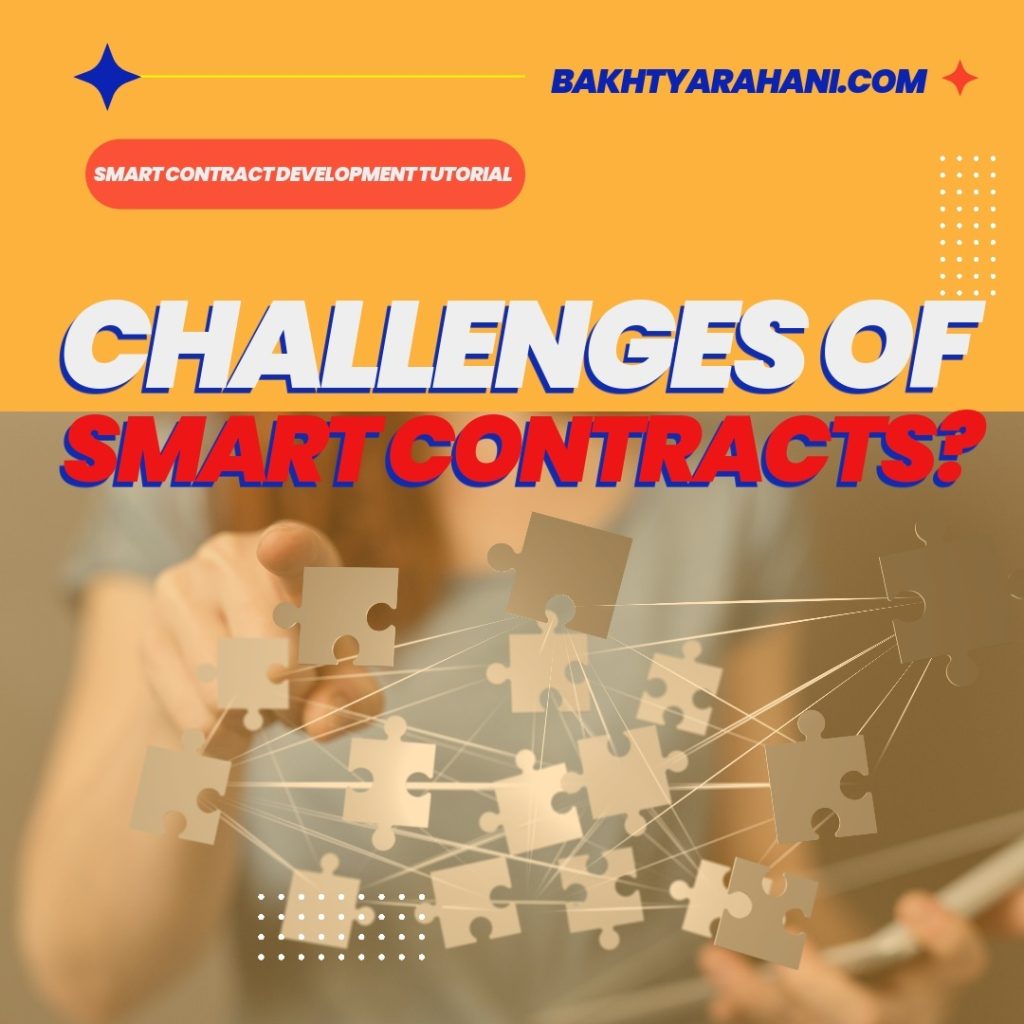
Challenges of smart contracts
Complexity: Developing smart contracts can be complex and requires specialized coding skills.
Security Vulnerabilities: Smart contracts can be susceptible to vulnerabilities, leading to potential exploits and hacks.
Irreversible Actions: Mistakes in smart contracts can lead to irreversible consequences.
Legal Recognition: The legal status of smart contracts varies by jurisdiction and may not be universally recognized.
Scalability: As blockchain networks grow, scalability issues can affect the efficiency of smart contracts.
Privacy Concerns: Public blockchains may raise privacy concerns due to transparent data storage.
Human Error: Errors in smart contract code can have significant repercussions.
Regulatory Compliance: Ensuring compliance with ever-changing regulations can be challenging.
Standardization: Lack of universal standards can hinder interoperability between different smart contract platforms.
Oracles: Dependency on external data sources (oracles) can introduce vulnerabilities.
User Adoption: Educating users and businesses about smart contracts is crucial for widespread adoption.
Upgradability: Managing upgrades and changes to smart contracts can be complex.
Understanding and addressing these challenges is essential for realizing the full potential of smart contracts while mitigating risks and ensuring a smoother transition to decentralized systems.
Who should learn smart contract development?
In a rapidly evolving digital landscape, smart contract development has emerged as a transformative skill set with the power to reshape industries. But who should embark on this journey of learning and mastering smart contract development? The answer is surprisingly broad. Whether you’re a seasoned developer looking to expand your expertise, an entrepreneur exploring innovative opportunities in blockchain, or a curious individual eager to understand the technology that’s redefining transactions and trust, learning smart contract development is an investment in the future. These self-executing agreements have applications across numerous sectors, from finance and supply chain to gaming and healthcare. They offer efficiency, security, and transparency that are increasingly essential in a digitally-driven world.
But it’s not just the domain of tech-savvy professionals. As the technology matures, its accessibility is expanding, making it an enticing prospect for a wider audience. For businesses seeking to streamline operations, regulatory experts navigating the complexities of blockchain, or even students eager to build a skill set for the future job market, smart contract development offers a gateway to new opportunities. In the following sections, we’ll explore the diverse range of individuals and professionals who stand to benefit from learning smart contract development, and why this skill is becoming increasingly vital in today’s digital landscape.
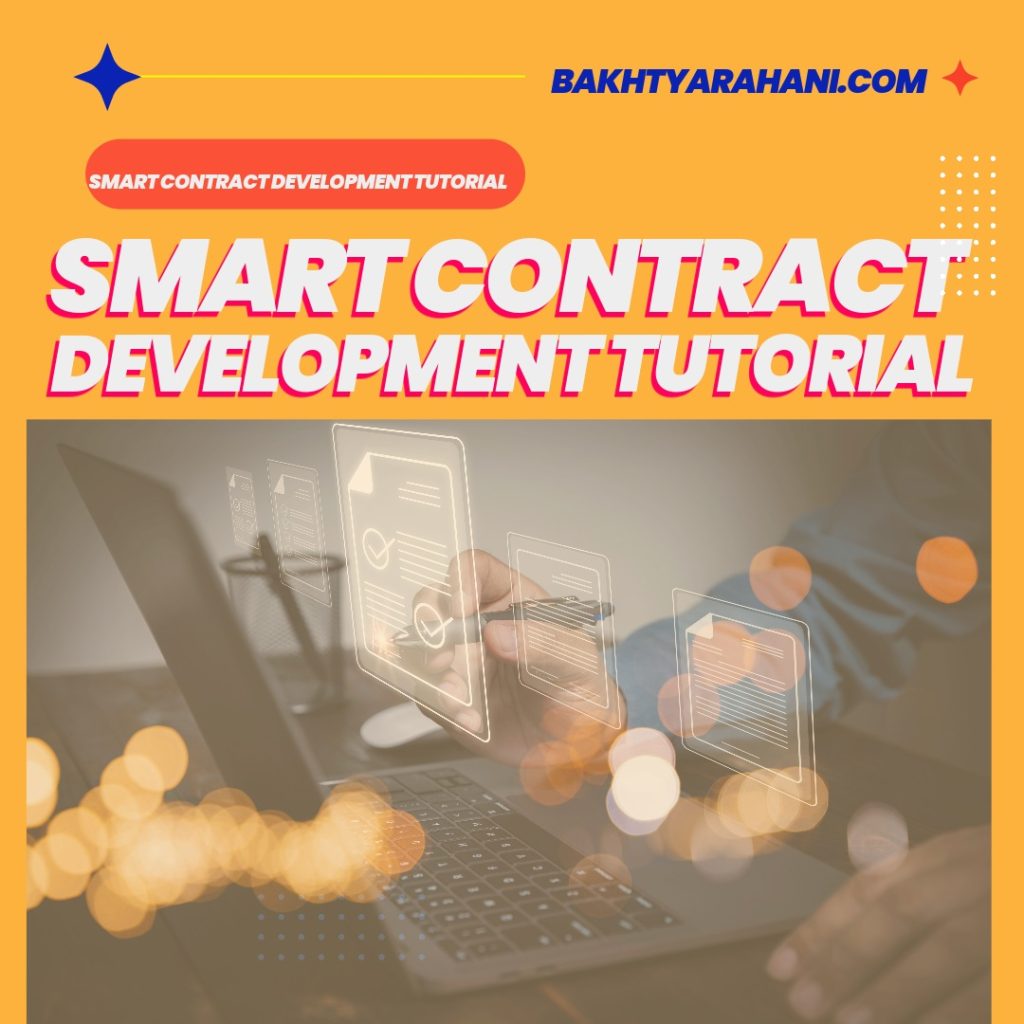
Smart contract development tutorial
Embarking on a journey into the world of smart contract development can be both exhilarating and daunting, especially if you’re new to the blockchain space. That’s where our Smart Contract Development Tutorial comes in. In this comprehensive guide, we’ll take you by the hand and lead you through the intricate process of creating, deploying, and interacting with smart contracts. Whether you’re an aspiring developer, a curious entrepreneur, or simply someone eager to explore the potential of blockchain technology, this tutorial will provide you with the essential knowledge and hands-on experience needed to bring your ideas to life in the decentralized world.
Smart contracts have transformed the way we conduct digital transactions and are at the heart of the blockchain revolution. Learning how to develop them is not just a skill; it’s a doorway to innovation and opportunity. In the upcoming sections, we’ll demystify the complex world of smart contract development, from the basics of coding and deploying to real-world applications and best practices. By the end of this tutorial, you’ll be well-equipped to harness the power of smart contracts and embark on your own journey of decentralized innovation.
Smart contract development for beginners
Smart contract development, once considered a niche skill, is now more accessible than ever for beginners eager to explore the world of blockchain technology. Getting started with smart contract development might seem like a daunting task, but fear not! Our guide is tailored for beginners, offering a clear roadmap to help you navigate the intricacies of this exciting field. We’ll break down the fundamentals, introduce you to the necessary tools and languages, and walk you through your first steps in coding smart contracts. With a focus on hands-on learning, you’ll gain the confidence needed to embark on your journey into the fascinating realm of decentralized applications.
Learning smart contract development doesn’t have to be a solitary journey. In addition to our tutorial, there’s a wealth of resources available to beginners eager to expand their knowledge. From online courses and forums to documentation and developer communities, you’ll find a supportive ecosystem of fellow learners and experts to guide you. Our second section, “Resources for Learning Smart Contract Development,” will provide you with a curated list of essential materials and platforms to accelerate your learning journey. By combining structured guidance with the abundant resources at your disposal, you’ll be well on your way to becoming a proficient smart contract developer.
Prerequisites for smart contract development
Smart contract development is an exciting journey into the world of blockchain and decentralized applications. To embark on this path with confidence, there are a few key prerequisites you should consider:
Programming Knowledge: While you don’t need to be a coding guru, having a basic understanding of programming concepts is crucial. Languages like JavaScript, Python, or Solidity (specifically designed for smart contracts) can be immensely helpful. If you’re new to coding, consider enrolling in introductory programming courses to build a strong foundation.
Blockchain Fundamentals: Smart contracts are built on blockchain technology, so understanding how blockchain works is essential. Concepts like distributed ledgers, consensus mechanisms, and decentralized networks will provide you with valuable insights into the underlying technology.
Access to a Computer: Smart contract development is a digital endeavor, so having access to a computer with a reliable internet connection is a must. You’ll be using development tools, compilers, and testing environments, all of which require a computer.
In the upcoming sections, we’ll delve deeper into each of these prerequisites, offering guidance on how to acquire the necessary skills and tools for a successful smart contract development journey. By ensuring you have these essentials in place, you’ll be well-prepared to explore the fascinating realm of smart contracts and blockchain technology.
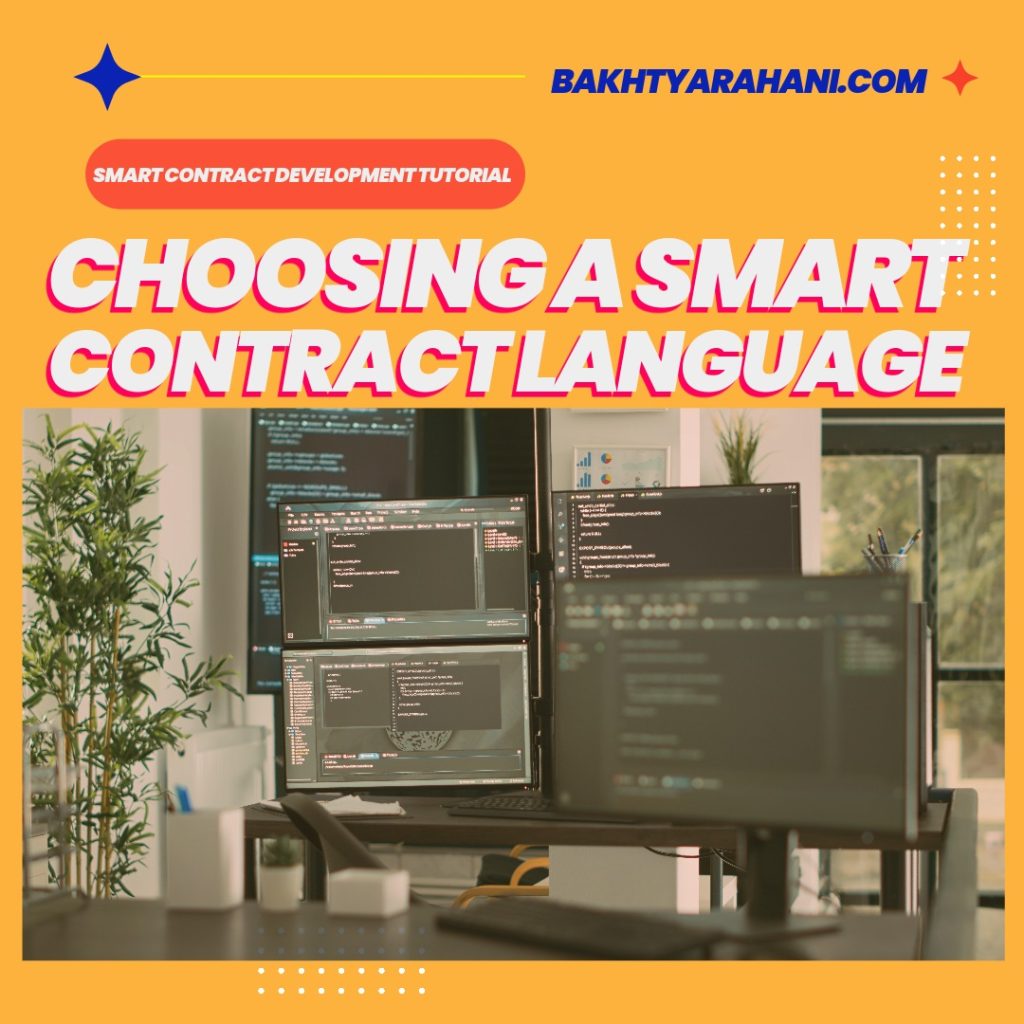
Choosing a smart contract language
When venturing into the world of smart contract development, one of the critical decisions you’ll face is selecting the right programming language. Each blockchain platform may support different languages, and choosing the most suitable one for your project is a crucial step. Let’s explore the key considerations when making this choice.
Platform Compatibility: Start by understanding which programming languages are compatible with the blockchain platform you intend to use. For example, Ethereum primarily uses Solidity, while others, like Tezos, support multiple languages.
Community Support: A thriving developer community is a valuable resource. Opt for a language with an active community, as it means better support, resources, and updates.
Security Features: Security is paramount in smart contract development. Some languages, like Solidity, are designed with security features that help reduce vulnerabilities.
Development Tools: Consider the availability of development tools and libraries for your chosen language. Robust toolsets can streamline your development process.
Learning Curve: Evaluate the learning curve of the language. Some languages may be easier to grasp for beginners, while others require more in-depth knowledge.
In the following sections, we’ll delve into specific programming languages commonly used for smart contract development, providing insights into their strengths and use cases. By understanding the factors mentioned above, you can make an informed decision when choosing a smart contract language for your project.
Choosing a smart contract platform
Selecting the right smart contract platform is a pivotal decision when entering the world of decentralized applications. With several blockchain platforms available, each offering unique features and capabilities, it’s essential to choose the one that aligns with your project’s goals. In this section, we’ll explore the key considerations when choosing a smart contract platform.
Ecosystem Compatibility: Start by assessing which blockchain platform best supports your project’s ecosystem. Consider factors like existing partnerships, development communities, and integration possibilities.
Scalability: Scalability is crucial for accommodating your project’s growth. Evaluate a platform’s scalability features, as this will determine its ability to handle increased transaction volumes.
Consensus Mechanism: Different platforms use various consensus mechanisms, such as Proof of Work (PoW) or Proof of Stake (PoS). Understanding these mechanisms and their implications is vital for platform selection.
Security Features: Security is paramount in smart contract development. Some platforms offer built-in security features and auditing tools, reducing the risk of vulnerabilities.
Development Tools: A robust set of development tools, including smart contract compilers and debugging utilities, can significantly enhance the development process.
Token Standards: If your project involves tokens or cryptocurrencies, consider the token standards supported by the platform. Ethereum, for instance, is known for its ERC-20 and ERC-721 token standards.
In the following sections, we’ll delve into specific blockchain platforms commonly used for smart contract development, providing insights into their strengths, use cases, and how to determine the best fit for your project. By considering these factors, you can make an informed decision when choosing a smart contract platform that aligns with your goals and requirements.
Smart contract development workflow
Navigating the intricacies of smart contract development requires a structured workflow to ensure your project’s success. In this section, we’ll outline a comprehensive smart contract development workflow that guides you from the initial idea to deployment and beyond. This structured approach will help you maintain transparency, minimize errors, and create efficient and secure smart contracts.
Define the Project Scope: Start by clearly defining your project’s scope, objectives, and functionalities. A well-defined project scope serves as your roadmap throughout the development process.
Select the Platform and Language: Based on your project’s requirements, choose a suitable blockchain platform and programming language for smart contract development. Consider factors like platform compatibility and security features.
Design the Smart Contract: Create a design for your smart contract, including the contract’s architecture, data structures, and functions. Planning the contract’s structure in advance can save time and effort during coding.
Write and Test the Code: Begin coding your smart contract according to the design. Thoroughly test the contract for errors and vulnerabilities using testing frameworks and tools.
Audit the Smart Contract: Consider having your smart contract audited by security experts to identify and rectify potential vulnerabilities. Security audits are critical for protecting your project from potential threats.
Deploy the Smart Contract: Once your smart contract is thoroughly tested and audited, deploy it on the chosen blockchain platform. Ensure you follow best practices to secure the deployment process.
Interact with the Contract: After deployment, interact with the smart contract to ensure it functions as intended. This may involve testing various functions and interactions.
Monitor and Maintain: Continuously monitor the smart contract’s performance and address any issues that arise. Regular maintenance is essential to keep your contract secure and operational.
In the following sections, we’ll delve into each step of the smart contract development workflow, providing detailed insights and best practices to help you navigate this journey successfully. By following this structured workflow, you can confidently take your smart contract project from concept to reality.
Writing a smart contract
In this section, we’ll take a hands-on approach to writing a simple smart contract code. This practical guide will give you a glimpse of the process and the key elements involved in creating a smart contract.
Step 1: Define the Smart Contract
Begin by defining the purpose of your smart contract. What task or agreement will it automate? For this example, let’s consider a basic smart contract for a crowdfunding campaign.
// SPDX-License-Identifier: MIT
pragma solidity ^0.8.0;
contract Crowdfunding {
address public owner;
uint public goal;
uint public balance;
constructor(uint _goal) {
owner = msg.sender;
goal = _goal;
balance = 0;
}
}
This code defines a simple smart contract for crowdfunding. It includes the contract’s owner (the address that deploys the contract), the funding goal, and the current balance.
Step 2: Constructor Function
In the code, you’ll find a constructor function that initializes the contract with the owner’s address and the funding goal. The msg.sender variable represents the address that deploys the contract. The balance is initially set to 0.
In the upcoming sections, we’ll explore additional features and functionality you can add to your smart contract code. Writing smart contracts is both an art and a science, and this example is just the beginning.
Compiling and deploying a smart contract
Once you’ve written the code for your smart contract, the next crucial steps are compiling the code and deploying the contract onto a blockchain network. This section will guide you through the process of turning your code into a functional smart contract.
Step 1: Compiling the Smart Contract
Compiling is the process of converting your high-level smart contract code into bytecode that can be executed on a blockchain. Most blockchain platforms have their own compilers that can handle specific programming languages. Here’s how you can compile your smart contract:
- Install the Compiler: Ensure you have the appropriate compiler for the blockchain platform you’re using. For Ethereum, you can use the Solidity compiler (solc). Install it using npm or another package manager.
- Compile the Contract: Use the compiler to transform your code into bytecode. You can do this through the command line or an integrated development environment (IDE). For example, to compile a Solidity contract, you can use the following command:
solc --bin Contract.sol - Check for Compilation Errors: After compilation, review the output for any compilation errors. Fix any issues before proceeding.
Step 2: Deploying the Smart Contract
Once your smart contract is successfully compiled, the next step is to deploy it onto a blockchain network. Deployment allows your contract to interact with users and other smart contracts on the network. Here’s how to deploy a smart contract:
- Choose a Blockchain Platform: Select the blockchain platform where you want to deploy your smart contract. Popular options include Ethereum, Binance Smart Chain, or others.
- Create a Deployment Transaction: To deploy your smart contract, you need to create a deployment transaction that contains the bytecode of your contract. You can do this using programming languages like JavaScript or tools provided by the blockchain platform.
- Pay Gas Fees: Deploying a smart contract often requires paying transaction fees, known as gas fees. Ensure you have sufficient cryptocurrency in your wallet to cover these fees.
- Initiate Deployment: Submit the deployment transaction to the blockchain network. This will trigger the deployment process.
- Confirm Deployment: Once the deployment is confirmed by the network, your smart contract is live and operational. You’ll receive an address that represents your deployed contract on the blockchain.
Now, your smart contract is deployed and ready to execute its functions on the chosen blockchain. You can interact with it by sending transactions or calling its functions through blockchain clients or decentralized applications (DApps).
Continuing, we will teach you how to easily compile and deploy your code using Remix and other platforms.
Interacting with a smart contract
Once your smart contract is deployed on a blockchain, it becomes accessible to users and other applications. Interacting with a smart contract involves executing its functions and accessing its data. This section will guide you through the process of interacting with a smart contract.
1. Sending Transactions
The primary way to interact with a smart contract is by sending transactions to it. These transactions can execute functions within the contract and change its state. Here’s how it works:
Choose a Wallet: To send transactions, you’ll need a compatible cryptocurrency wallet that allows interaction with smart contracts. Popular choices include MetaMask and Trust Wallet.
Access the Contract: Add the smart contract’s address to your wallet, allowing it to recognize and interact with the contract.
Send Transactions: Use your wallet to send transactions that invoke specific functions in the smart contract. For example, if your contract is a crowdfunding platform, you can send a transaction to contribute funds.
Pay Gas Fees: Like deployment, executing transactions on a blockchain typically incurs gas fees. Ensure your wallet has sufficient cryptocurrency to cover these fees.
2. Reading Data
Apart from sending transactions, you can also read data from a smart contract. Some functions within a contract are view functions, which don’t modify the contract’s state but provide information. Here’s how to read data:
Access the Contract: Similar to sending transactions, add the contract’s address to your wallet.
Read Functions: Use your wallet or a DApp to call read functions within the contract. These functions return data without altering the contract’s state. For instance, you can check the current balance of a crowdfunding contract.
3. Decentralized Applications (DApps)
DApps are applications built on blockchains that allow users to interact with smart contracts seamlessly. They provide a user-friendly interface for executing functions and reading data from contracts. You can access DApps through web browsers or mobile apps, simplifying the interaction process.
Interacting with a smart contract opens up a world of possibilities, from participating in token sales to using decentralized finance (DeFi) platforms. The ability to execute trustless transactions and access transparent data is one of the core advantages of blockchain technology.
Smart contract development examples
To better understand how smart contracts work, let’s explore some real-world examples of their applications. These examples demonstrate the versatility and potential impact of smart contract development.
1. Decentralized Finance (DeFi)
Decentralized finance, or DeFi, has witnessed remarkable growth in recent years. DeFi platforms leverage smart contracts to offer financial services without intermediaries. For instance, lending and borrowing platforms like Compound and Aave use smart contracts to automate loan agreements, interest calculations, and collateral management. Users can earn interest on their assets or access loans without relying on traditional banks.
2. Non-Fungible Tokens (NFTs)
The NFT market has taken the art, gaming, and entertainment industries by storm. NFTs are unique digital assets that can represent ownership of digital art, collectibles, and more. Smart contracts underpin NFT platforms, ensuring the scarcity and authenticity of these digital items. CryptoKitties, NBA Top Shot, and various NFT marketplaces utilize smart contracts to create, buy, sell, and trade digital collectibles.
3. Supply Chain Management
Smart contracts have the potential to revolutionize supply chain management. They can automate the tracking of goods from manufacturers to consumers, reducing fraud and errors. For instance, a smart contract can record each step of a product’s journey on a blockchain, allowing consumers to verify the origin and authenticity of items like organic produce or luxury goods.
4. Voting Systems
Blockchain-based voting systems aim to enhance the security and transparency of elections. Smart contracts can manage the voting process, ensuring that each vote is accurately recorded and preventing double voting. By using smart contracts, voting systems can provide a tamper-proof and auditable record of election results.
5. Tokenization of Assets
Smart contracts enable the tokenization of real-world assets such as real estate, art, or company shares. This process involves representing ownership of physical assets with digital tokens. Investors can then trade these tokens on blockchain-based platforms, increasing liquidity and accessibility to a broader range of investors.
These examples showcase the diverse applications of smart contracts across various industries. Smart contract development continues to evolve, unlocking new possibilities for innovation and disruption. Whether you’re interested in finance, art, logistics, or governance, smart contracts have the potential to transform the way we interact with digital and physical assets.
Smart contract development best practices
Creating secure and effective smart contracts is crucial to the success of any blockchain project. To help you build reliable and robust smart contracts, we’ve compiled a set of best practices to follow throughout your development process.
1. Security Audits
Before deploying a smart contract, conduct thorough security audits. Collaborate with blockchain security experts or audit firms to identify vulnerabilities, bugs, and potential issues. Audits help ensure that your contract is resistant to hacking and other security threats.
2. Use Established Libraries
Leverage established and community-vetted libraries and contracts. Reusing trusted code reduces the risk of introducing vulnerabilities. Platforms like OpenZeppelin provide a library of pre-audited smart contracts that can save you time and enhance security.
3. Data Minimization
Store only essential data on the blockchain. Minimizing data on-chain reduces the cost of storage and minimizes the risk of exposing sensitive information. Store detailed data off-chain and provide cryptographic proofs when necessary.
4. Gas Optimization
Efficient gas usage is critical in cost-effective smart contract development. Minimize unnecessary computations, data storage, and loops to reduce gas costs. Optimize your contract’s architecture to lower transaction fees for users.
5. Access Control
Implement access control mechanisms to define who can interact with your smart contract. Use role-based access or whitelists to restrict access to specific functions or features. Avoid overly permissive access.
6. Error Handling
Smart contracts must handle errors gracefully. Implement error-handling mechanisms to ensure that the contract can recover from unexpected situations without compromising security.
7. Upgradability
Plan for smart contract upgradability from the outset. Use proxy patterns or create upgradable contracts with well-defined upgrade processes to make future changes and improvements without disrupting your users.
8. Documentation
Comprehensive and clear documentation is essential. Describe the contract’s functions, data structures, and usage guidelines. Documentation helps users and developers understand and interact with your contract effectively.
9. Testing
Extensive testing is vital. Develop test cases to evaluate the contract’s functionality and security. Automated testing tools like Truffle and Hardhat can help streamline this process.
10. Regulatory Compliance
Consider regulatory requirements and compliance. Ensure your smart contract aligns with local and international regulations, especially if it deals with financial assets or personal data.
Adhering to these best practices will enhance the security, functionality, and reliability of your smart contracts. By following these guidelines, you can build smart contracts that not only meet your project’s goals but also inspire confidence and trust among users and stakeholders.
Smart contract development languages
When it comes to developing smart contracts, choosing the right programming language is a crucial decision. Different blockchain platforms support various languages, each with its unique features and advantages. Below, we’ll explore some of the prominent programming languages commonly used for smart contract development:
Solidity
Solidity is the most popular and widely used programming language for Ethereum smart contracts. It’s specifically designed for the Ethereum platform and is known for its simplicity and flexibility. Solidity allows developers to create complex smart contracts with ease.
Vyper
Vyper is another programming language for Ethereum smart contracts. It focuses on readability and reduced complexity. Vyper’s design philosophy is to make it harder to write insecure code, making it a suitable choice for security-conscious developers.
Rust
Rust is known for its focus on safety and performance. It has been gaining popularity in the blockchain space, particularly for projects like Polkadot and Solana. Rust’s memory safety features make it an excellent choice for secure smart contract development.
Smart contract development platforms
Smart contract development doesn’t happen in isolation; it’s deeply intertwined with the blockchain platform you choose. Different blockchain platforms offer varying capabilities and features for smart contract development. Below, we’ll explore some of the prominent platforms that support smart contract development:
Smart contract development for Ethereum
Ethereum is the pioneer of smart contract platforms. It introduced the concept of decentralized applications (DApps) and brought smart contracts to the forefront of blockchain technology. Solidity is the primary language used for Ethereum smart contract development, making it a go-to choice for many developers.
Smart contract development for Binance smart chain(BSC)
Binance Smart Chain has gained popularity for its compatibility with Ethereum. It allows developers to use the same tools and languages as Ethereum, such as Solidity. This compatibility makes it a convenient choice for those looking to deploy smart contracts with lower fees.
Smart contract development for Polkadot
Polkadot offers a unique approach to smart contracts by providing a multi-chain framework. Developers can create and deploy smart contracts on specific parachains within the Polkadot ecosystem. This modular design allows for scalability and customization.
Smart contract development for Solana
Solana is designed for high-performance decentralized applications. It uses Rust for smart contract development, making it a choice for developers who prioritize speed and scalability.
Smart contract development for Avalanche
Avalanche provides a highly customizable and scalable smart contract platform. Developers can use multiple programming languages, including Solidity, to build smart contracts.
Choosing the right platform for your smart contract development depends on factors like your project’s requirements, the community support, scalability, and the features offered by each platform. It’s essential to research and assess which platform aligns best with your specific use case and development goals.
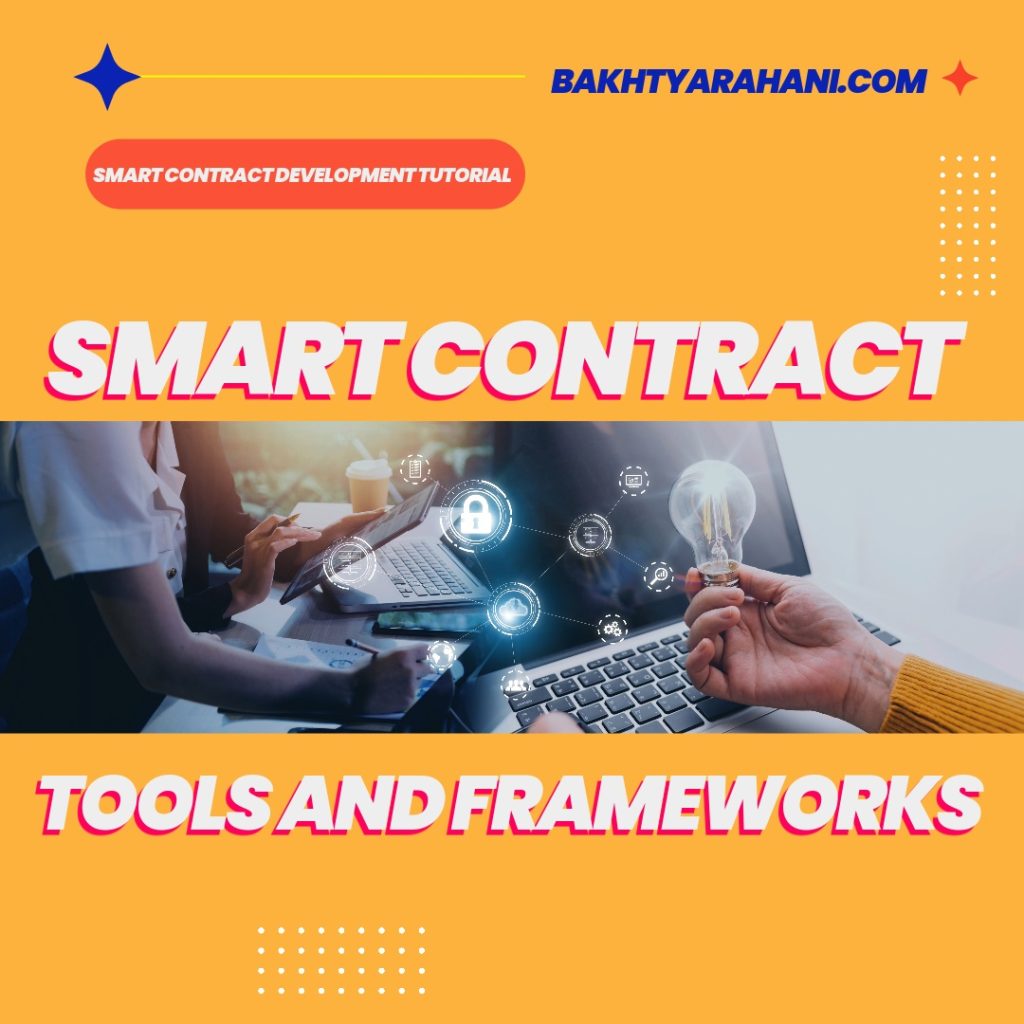
Smart contract development tools and frameworks
- Remix blockchain development
- Truffle blockchain development
- Hardhat blockchain development
- Brownie blockchain development
- Embark blockchain development
- OpenZeppelin blockchain development
- Waffle blockchain development
- ZeppelinOS blockchain development
- Ethers.js blockchain development
- Moralis blockchain development
- Web3.js blockchain development
- Alchemy blockchain development
- Infura blockchain development
- Chainlink blockchain development
- The Graph blockchain development
Successful smart contract development requires more than just programming skills; it demands a robust set of tools and frameworks to streamline the development process. Here are some essential tools and frameworks that can significantly enhance your smart contract development journey:
- Remix: Remix is a web-based integrated development environment (IDE) specifically designed for Ethereum smart contract development. It offers a user-friendly interface, real-time code compilation, and debugging capabilities, making it an excellent choice for beginners and experienced developers alike.
- Truffle: Truffle is a widely used development framework for Ethereum. It provides a suite of tools that simplifies smart contract development, testing, and deployment. Truffle’s built-in development server and asset pipeline streamline the entire development process.
- Hardhat: Hardhat is a development environment for Ethereum that offers extensibility and flexibility. It allows developers to write scripts for tasks like deploying contracts and testing. Hardhat also supports built-in testing with popular testing libraries like Mocha and Chai.
- Brownie: Brownie is a Python-based smart contract development and testing framework. It’s known for its simplicity and extensive plugin support, making it a preferred choice for developers who are comfortable with Python.
- Embark: Embark is a framework for Ethereum and other blockchain platforms. It simplifies smart contract development, deployment, and testing. It also includes a development server for DApp development.
- OpenZeppelin: OpenZeppelin offers a collection of pre-audited and secure smart contract libraries. Developers can use these libraries to build on top of battle-tested code, enhancing the security and reliability of their contracts.
- Waffle: Waffle is a TypeScript-based smart contract development framework for Ethereum. It provides a testing suite and an integrated development environment to ensure the correctness of your contracts.
- ZeppelinOS: ZeppelinOS is a development platform that focuses on upgradeability and modularity for Ethereum smart contracts. It allows for easy contract upgrades without disrupting the entire system.
- web3.js: is a JavaScript library that allows developers to interact with the Ethereum blockchain, making it a crucial tool for building decentralized applications (DApps) and smart contracts. It provides a wide range of functions and methods for handling various Ethereum-related tasks, including sending transactions, querying blockchain data, and managing accounts. With web3.js, developers can create user-friendly interfaces that connect their DApps to the Ethereum network, enabling users to interact with smart contracts and perform transactions seamlessly. It simplifies the process of integrating blockchain functionality into web applications, making it a valuable resource for Ethereum developers.
These tools and frameworks simplify the development, testing, and deployment of smart contracts, reducing the chances of errors and vulnerabilities. The choice of tools depends on your familiarity with the programming languages they support and the specific requirements of your project. It’s essential to explore and experiment with these tools to find the ones that best suit your smart contract development needs.
Smart contract Applications
Smart contract development for DeFi:
- Smart contracts for decentralized exchanges (DEXs)
- Smart contracts for lending and borrowing protocols
- Smart contracts for asset management protocols
- Smart contracts for prediction markets
Smart contract development for NFTs:
- Smart contracts for minting NFTs
- Smart contracts for trading NFTs
- Smart contracts for fractional ownership of NFTs
Smart contract development for gaming:
- Smart contracts for in-game items and currencies
- Smart contracts for play-to-earn games
- Smart contracts for decentralized gaming platforms
Smart contract development for enterprise:
- Smart contracts for supply chain management
- Smart contracts for digital identity management
- Smart contracts for data management
- Smart contracts for financial services
- Metaverse blockchain development
- Supply chain management blockchain development
- Healthcare data management blockchain development
- Real estate management blockchain development
- Intellectual property rights protection blockchain development
- Peer-to-peer lending blockchain development
- Secure file sharing blockchain development
Conclusion
In this comprehensive smart contract development tutorial, we’ve explored the fundamental concepts, tools, and steps to embark on your journey into the world of blockchain and decentralized applications. Smart contracts have revolutionized how we approach agreements and transactions, offering transparency, security, and automation. With the right knowledge and tools, you can harness the power of smart contracts to build innovative applications, whether in the realms of decentralized finance, non-fungible tokens, gaming, or enterprise solutions.
As you continue your smart contract development adventure, remember that practice and experimentation are your best allies. Stay updated with the ever-evolving blockchain landscape, explore different development frameworks, and be proactive in seeking solutions to challenges that arise. Your contributions to this exciting field can reshape industries and pave the way for a decentralized future.
So, what’s next? Dive into the world of smart contract development, embark on your projects, and don’t hesitate to reach out to the vibrant blockchain community for support and inspiration. The possibilities are limitless, and your journey is just beginning. Happy coding and building!
Smart contract development jobs and careers
- How to find a smart contract development job
- Smart contract development salaries
- Smart contract development skills in demand

